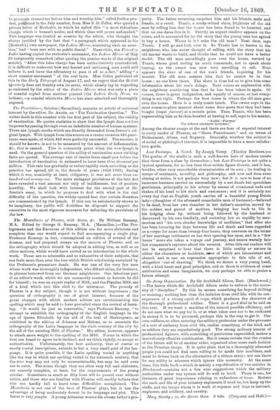CURRENT LITERATURE.
The British Quarterly Review. October. (Hodder and Stoughton.) —We may be permitted to congratulate the British Quarterly on the publication of its hundredth number. We have frequently had occasion to differ from it ; and there is not a little in the essay on "Retrospect and Prospect," with which it commemorates its twenty-fifth anniversary, that we do not agree with or like. But we feel that it is justified in assum- ing a tone of triumph ; it has done good service to its own cause, and, we may say, to the cause of liberty; it has had a share in achieving great successes. Whatever may be the fate of Church Establishments, it is certainly an unmixed good that the men who assail them, and who, if they perish, must rise into greater importance by their fall, should be men of liberality and culture. If the British Quarterly can do some- thing to secure real freedom of religious thought—and religious thought, we cannot repeat too often, is at present leas free in the sects than in the Church—if, for instance, it can help on the Noncon- forming congregations to be as liberal and wise as we believe many of the younger Nonconforming ministers are, it will be doing much to obviate one of our chief objections to the voluntary system. There are other difficulties which we cannot but think its advocates persistently ignore. There is, for instance, the objection to removing without any substitute of which we have over heard, the incalculable civilizing influ- ence of the Establishment in the rural districts. But this is not the time for such a discussion. There can be no question that all parties must be benefited by so able a periodical as is the organ of the Non- conforming body. We heartily wish it prosperity. In the present number there is plenty of interest. An article, on the "Irish National School Question " puts the question very plainly. It seems, to compress the facts into a line, that the Roman Catholic Bishops want to have control of the schools, deriving as those do support from the State in a far greater proportion than in England, and that without a conscience clause. There is the rub. The writer of an article on " Daniel Defoe " gallantly defends the great man from the charges which have been founded on the late discovery regarding his position in the later years of his life. We quite sympathize with his feeling. It is a positive loss of no common kind to have the character of a hero such as Defoe was, besmirched. And yet the loss to morality may be more serious if we use or accept sophistical defences. After all, in plain language, as a writer in Blackwood puts it, Defoe took Tory money, possibly from Tory statesmen, certainly from Tory readers of his papers. It was a base thing, and we cannot but think the worse of him for it. What is inconceivable about it is, how the Tory shepherds should over have let such a wolf into their fold. It makes one ready to doubt, against all evidence, the genuineness of the discovered letters. One omission we notice with regret. The statement in the April number that Keshub Chunder Sen, the chief leader of the Brahma Somaj or Theistic Church in India, " permits the more degraded of his followers to prostrate themselves before him and worship him," called forth a pro- test, published in the July number, from Mini S. D. Collet, who quoted a private, letter of Keshub's, in which he called this " a most ridiculous charge, which is beneath notice, and which time will prove unfounded." This language was treated as evasive by the editor, who thought the charge justified by the fact that " a paragraph which appeared in his [Keshub's] own newspaper, the Indian Mirror, containing such an asser- tion," had been met with no public denial." Meanwhile, the Friend of India having copied the reviewer's statement, the Indian Mirror of May 23 indignantly remarked (after quoting the precise words of the original article), "After this false charge bin been authoritatively contradicted, it is difficult to make out how any honest and unbiassei man could still believe it, and have the effrontery to pass it off as a fact," adding " a short counter-statement " of the real facts. Mies Collet published all this in the Daily Telegraph of August 17, and we regret that the British Quarterly does not frankly own its error, which clearly lay in regarding as endorsed by the editor of the Indian Mirror what was only a piece of scandal copied from another journal (the Indian Daily News, we believe),—a scandal which the Mirror has since attacked and thoroughly exposed.































 Previous page
Previous page